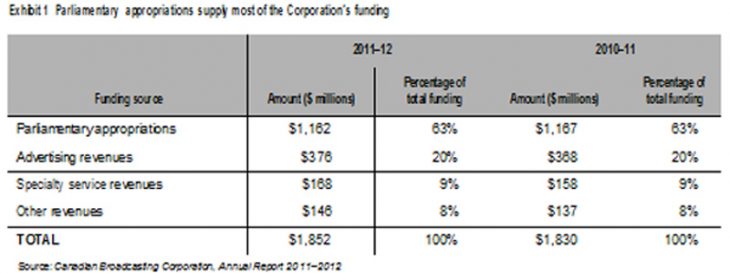
OTTAWA – The Office of the Auditor General has found “no significant deficiencies in the Canadian Broadcasting Corporation’s systems and practices” according to its just released audit.
The 2013 Special Examination Report was presented by the Office of the Auditor General to the Corporation’s Board of Directors. “This clean audit opinion is the best result that a federal agency can obtain,” said CBC/Radio-Canada’s president and CEO Hubert T. Lacroix in a statement.
Covering the October 2011 to June 2012 period, the report confirms that the public broadcaster manages its assets efficiently and economically, carries out its operations effectively, and also safeguards and controls its assets says the CBC. “This exercise demonstrates to Canadians that we soundly administer the public broadcaster,” added Lacroix.
While the Auditor General noted “good practices in a number of areas,” it also noted the Corporation would benefit from improving some of its systems and practices, particularly in its management of human resources:
- The CBC/Radio-Canada has elements of a good corporate governance framework that meets the expectations of best practices for Board stewardship, shareholder relations, and communication with the public. Board members are provided with the necessary orientation and training. We noted that two important strategic plans did not receive timely approval.
- The Corporation has clearly defined its strategic direction. While the Corporation remains an arm’s length organization, it has taken into account government priorities, and has specific measurable goals and objectives aimed at achieving its mandate. Strategic planning is informed by identification of risks, and operational plans are aligned with the strategic plan. A performance measurement framework is in place, addressing the significant deficiency identified in our 2005 special examination report. Performance indicators have been identified and implemented, although there are no people management measures included in the framework.
- We noted a number of weaknesses in the Corporation’s systems and practices for human resources that could impede its ability to attract, recruit, develop, and retain employees. Despite recent steps to address recruitment and staffing issues, competency profiles do not exist for most occupational groups. In addition, the division responsible for human resources has not had consistent leadership since 2008. During that period the Corporation has had several different strategic plans for human resources. Because of this level of change in strategic direction over a relatively short time, the Corporation risks spending more time and energy on planning rather than on implementing initiatives and moving forward.
- The CBC/Radio-Canada has in place an IT security policy aimed at controlling and protecting the Corporation’s IT assets and maintaining data integrity and confidentiality. It also has guidelines containing principles and best practices for security. However, the current policy does not address the handling of sensitive information normally considered to be classified or protected under government policy. We noted examples where the Corporation did not classify and handle sensitive information appropriately.
The CBC replied that it has agreed to the recommendations and is responding by taking measures that are “intended to be in place for the next fiscal year and will be reported in our Corporate Plan and Annual Report.”

The public broadcaster notes it has made significant progress since its last special examination, which took place in 2005. This includes the implementation of its 2015 Strategy: Everyone, Every way and improved management of its real estate portfolio.



